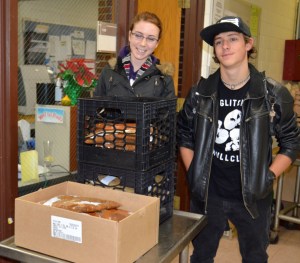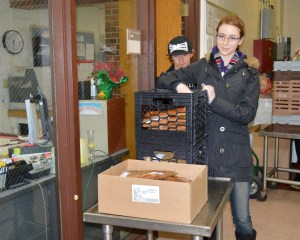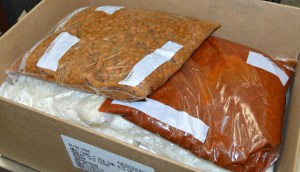FARMINGTON — Bags of rice, beans and beef stroganoff were recovered from the local campus dining service at the University of Maine at Farmington on Wednesday and donated to Western Maine Homeless Outreach.
Catherine Dufault, a UMF junior from Holden, Mass., and intern for Aramark, the campus food service, has developed a purpose for leftover food.
For a second week, she collected leftovers — this time, beans, rice and stroganoff — and took it to the shelter. Previously, the leftovers have been recycled through composting.
“Whatever goes out goes to a good cause,” she said of the leftovers. “It is either composted or recovered.”
As part of an independent study on hunger in Maine, Dufault started a chapter of the Food Recovery Network at UMF.
“Food Recovery Network unites students on college campuses to fight food waste and hunger by recovering perishable food that would otherwise go to waste from their campuses and communities and donating it to people in need,” according to network’s website.
The organization started on a college campus in Maryland in 2011 when students recovered 30,000 meals over the school year to give to Washington-area agencies. Since then, the network’s goal has expanded to involve 180 college campuses and recover 1.2 million pounds of food by May 2016.
“Forty percent of all food produced in America ends up in the waste stream,” according to Food Recovery Network website. “At the same time, one in six Americans is food insecure.”
Just this week, U.S. Rep. Chellie Pingree, D-Maine, announced plans to introduce the Food Recovery Act, with the intent of reducing the amount of food wasted each year in the United States. The bill proposes ways to reduce food waste from grocery stores, restaurants, schools and farms.
As an Aramark intern and working with the recovery network, Dufault saw good-quality fresh or prepared foods being taken out for composting. She contacted the homeless shelter to see if she could help.
Aides at the shelter are grateful for the food, she said, although it is too early for a response from shelter residents.
Dufault and another Aramark intern, Louise Villemont, a junior from Farmington, N.H., and other UMF Sustainable Campus Coalition members now take food to the shelter weekly.
The food is either frozen or kept in a temperature-controlled environment, Dufault said. The rule is “if you wouldn’t eat it, then you don’t donate it,” she said.
The project was difficult to coordinate. As an Aramark intern working with the recovery program, she was finally able to get it off the ground, she said.
“Catherine has been concerned about issues of food insecurity for some time,” said Wendy Harper, associate professor of economics and instructor for Dufault’s independent study. “She began formal work on this project last semester through an independent study and through participation in UMF’s Good Food Co-Lab.”
The Co-Lab is a collaborative of classes that supports projects and the study of ways to provide good food to the campus and community.
Starting the UMF chapter of the Food Recovery Network helped Dufault navigate some of the legal food-safety issues surrounding food recovery, Harper said.
A student of natural resource management, Dufault chose to stay at UMF and continue to serve rather than move on to another school to pursue her studies.
“This has become a passion I didn’t know I had,” she said of her commitment to help the hungry and serve the community.
Through the independent study, Dufault saw hunger on campus, particularly among commuting students “who can’t afford food, let alone good food,” she said.
Next fall, she hopes to start a food pantry on campus for students.



Comments are no longer available on this story